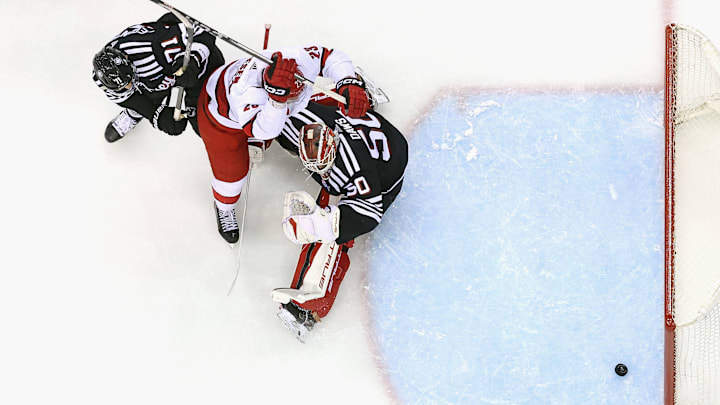The New Jersey Devils found themselves down 1-0 in 47 of their 65 games this season. Giving up the first goal has nearly become a habit for this team. The Devils have other issues to try to address to finish the season strong, but it would be wise for the team to try to rectify the issue since playing behind from the get-go is never ideal. Several elements at play cause the Devils to continually find themselves in the same situation.
Slow Starts
The Devils have come out slow and sloppy in multiple games this season. If a team isn’t skating or passing well, they will be taken advantage of, especially by good teams. Having a strong start is essential, especially in games where fatigue could set in in the later periods such as back-to-back games. If the players start the game looking tired, it doesn’t bode well for the second and third periods. Interim head coach Travis Green has already commented on wanting to focus on having good starts and coming out strong in the first period. The hope is that the players get the message and translate it into their play.
Offensive Decision Making
Some might think that the Devils are behind continuously because they don’t take enough shots on the offensive side. While there have been occasional games where that is the case, more often, the Devils are taking shots on net throughout the first period. In fact, the team averages 32.03 shots on goal per game, which is ninth in the league. The issue is not quantity but quality. So many times, the Devils will take a hasty, lazy shot instead of trying to create a quality chance on the net.
Hockey is a fast game, but players have to be able to analyze the situation and determine the best play to make. Wasting opportunities in front of the net on shots that stand no chance of going in isn’t the best use of offensive zone time. Some players will have a higher hockey IQ than others and may find it easier to know how best to navigate around an opposing team’s defense and goalie. But the Devils, as a team, should commit to working on creating solid chances for themselves to score. This is where smart coaching comes into play; time will tell if Travis Green can instill a smarter in-front-of-net presence into the squad.
Defensive Mistakes
Devils veteran defenseman Dougie Hamilton hasn’t played since November and may not play the rest of the season. Hamilton’s absence created a noticeable hole in the Devils defense. Rookie Luke Hughes made his full-season debut this year and has logged an average of just over 21 minutes of ice time per game. Another rookie, Simon Nemec, was called up from Utica in December to help carry the defensive load. Both young players, as can be expected, have had ups and downs as they adjust to the NHL level, pace of play, and schedule. In an ideal world, there would be more experienced and skilled defensemen on the team to help Hughes and Nemec ease into their roles and experience fewer growing pains, but the Devils, unfortunately, don’t have that luxury.
In addition to Hamilton, Smith, Siegenthaler, Marino, and Bahl have all missed time this season, which has led the defensive options to be stretched thin. The Devils haven’t had a large margin for error, so defensive mistakes have often been costly. Goaltending has been inconsistent and, because of that, even small mistakes from defensemen have, at times, resulted in opposing team goals. It’s a given that rookies will make “rookie mistakes,” but the Devils have seen costly errors from some of their more senior players like Brendan Smith and John Marino. Locking down defensively and preventing mistakes from costing the team may not always result in the Devils scoring, but it certainly keeps them from being scored on.
Inconsistent Goaltending
The goaltending issue has haunted the Devils all season. Now that Vitek Vanecek is gone, the team has two new options: Jake Allen and Kaapo Kahkonen. Nico Daws and Akira Schmid, who have been carrying the goaltending load, remain available as well. It’s no secret that poor goaltending will result in letting in early goals. Sometimes, these early chances have been difficult saves to make, but other times, they’ve been must-save goals that end up trickling through and being devastating for the team. If the new additions can help create some consistency in net, the Devils stand a much better chance of preventing themselves from being down early.
There are numerous aspects of the game the Devils can work on to prevent themselves from continuously giving up the first goal. Travis Green has the opportunity to help this squad clean up their game and set a more positive tone as the season finishes up. Playing down a goal from the start isn’t enjoyable for the team or for fans to have to watch. The positive side of this is that there are tangible steps the Devils can take to break the habit. The question is, will they?
